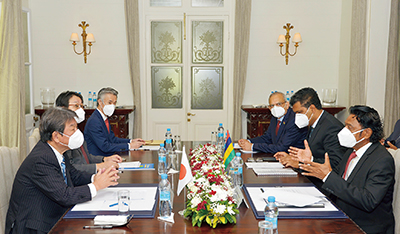Diplomatic Bluebook 2021
Chapter 2
Japan's Foreign Policy by Region
Section 8 Africa
1 Overview
Africa, with a population of over 1.3 billion in 54 countries, has attracted the interest of the international community, owing to its high potential and rich natural resources.
At the same time, Africa still faces challenges such as conflicts and political turmoil that threaten peace and stability, terrorism and violent extremism, and the serious poverty and development issues. Overcoming these challenges in Africa is also important for the peace and prosperity of the international community as a whole.
In 2020, infections of the novel coronavirus disease (COVID-19) spread across Africa as well. The number of COVID-19 cases in Africa has increased at a slow pace since the first case was confirmed in Egypt in February. After peaking in August, the number of newly confirmed cases decreased mainly in Sub-Saharan Africa, but since fall 2020, the number of infections has started to rise again in some countries, and Africa experienced a second wave after the end of the year. With many countries having weak healthcare systems, COVID-19 in Africa is likely to continue to be a serious issue.
Japan has been contributing to the development of Africa for many years through the Tokyo International Conference on African Development (TICAD), which boasts a history of more than 25 years, based on the basic principles of African ownership and partnership with the international community. Through this initiative, Japan has been making efforts with a focus on the protection and empowerment of individuals based on the concept of human security.
Under this vision, Japan has supported health and medical systems in Africa in the medium to long term through TICAD. The concrete results of these efforts have been demonstrated during the recent spread of COVID-19. For example, Japan has provided support for the establishment of the Noguchi Memorial Institute for Medical Research in Ghana and assisted in the training of its medical laboratory technologists. The Institute serves as the hub of the country's response to COVID-19 and processes up to about 80% of PCR tests carried out in the country.
As the spread of COVID-19 has had a significant impact on Africa's economy and society, Japan has engaged in a multilayered approach in its efforts including support for achieving Universal Health Coverage (UHC) in Africa, based on the concept of human security with the aim of “leaving no one's health behind.” The following are examples of these efforts; First, Japan enhanced Africa's ability to respond to COVID-19 by supporting the improvement of medical equipment and training medical staff. In fact, in response to the spread of COVID-19, Japan provided support such as capacity building and provision of health and medical equipment to 48 out of 54 African countries (as of December 2020) according to their individual circumstances through bilateral approaches or international organizations. Second, to build a robust and comprehensive health and medical system, Japan is, for example, supporting the Kenya Medical Research Institute, and is developing human resources to disseminate maternal and child health handbooks in Ghana. Third, as a response to socio-economic issues, Japan provided humanitarian assistance to refugees and internally displaced persons due to damage from desert locusts and floods, and the threats of terrorism and war. Furthermore, in the field of peace and stability, Japan contributed to institution building including support through the PKO Training Centers under the New Approach for Peace and Stability in Africa (NAPSA) announced by Japan at TICAD7 in August 2019.
The 8th Tokyo International Conference on African Development (TICAD8) will be held in Tunisia in 2022. This will be the second time TICAD is held in Africa, since TICADVI in Kenya in 2016. Looking ahead to TICAD8, Japan will actively tackle various African development challenges that have been highlighted due to the spread of COVID-19.
In December 2020, despite challenges the COVID-19 pandemic poses to high level visits, Foreign Minister Motegi made his first visit to Africa after taking office as Minister, travelling to Tunisia, the TICAD8 host country, and three Southeast African countries facing the Indian Ocean─Mozambique, South Africa and Mauritius. In January 2021, he visited Senegal and Kenya, becoming the first Japanese Foreign Minister to visit a total of six African countries in two months.
 Japan-Mauritius Foreign Ministers' Meeting
Japan-Mauritius Foreign Ministers' Meeting(December 13, Vacoas-Phoenix, Mauritius)
 Courtesy call to President Sall of Senegal
Courtesy call to President Sall of Senegal(January 11, 2021, Dakar, Senegal)
During these visits, Foreign Minister Motegi met with the leaders and foreign ministers of each country and confirmed to promote African development leading up to TICAD8 and to strengthen business relations, looking ahead to the post COVID era. The Minister also exchanged views and confirmed to cooperate to achieve the vision of a “Free and Open Indo-Pacific (FOIP).” Foreign Minister Motegi's two visits to Africa put into practice “diplomacy with a sense of caring and robustness” in Africa to maintain and strengthen a free and open international order based on the rule of law, and laid the foundation for Japan to exercise leadership in shaping a post-COVID-19 international order.
